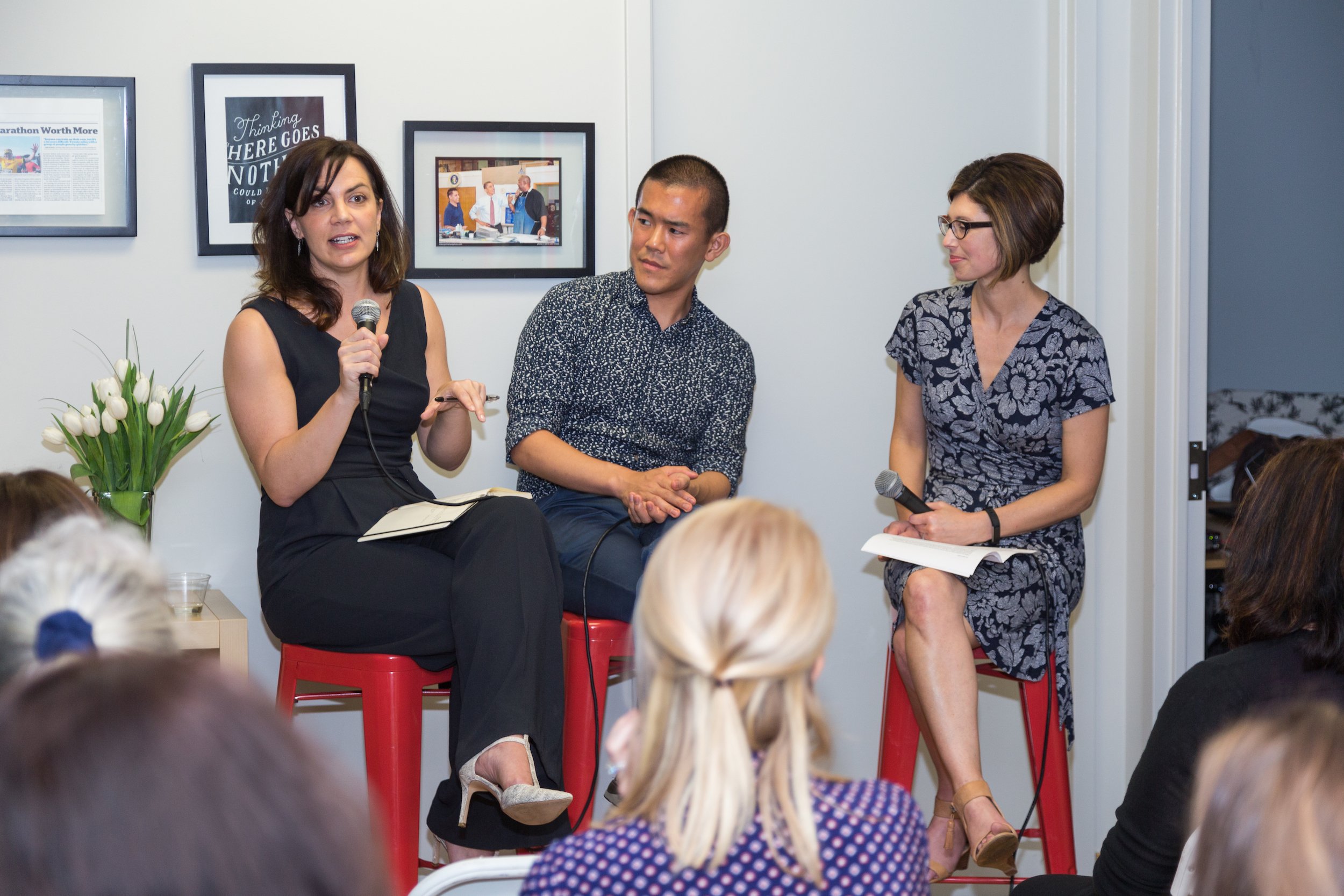Community Gatherings
Mission Forward® is the signature education program of Mission Partners. The initiative launched in 2014 as a speaker series of Mission Partners’ founder Carrie Fox, designed to drive deeper conversations among innovative thinkers, makers, and doers in social change. Building upon the speaker series, Mission Forward has expanded to include educational resources, the podcast, community conversations, workshops, and tools designed to help social sector leaders build more equitable communities.
Moving a mission forward can be complicated and difficult work. There are weighty issues to contend with, complex conversations, ambitious goals, and limited resources. To address the challenges that we hear our community regularly confronted with, we collaborate to create community events and conversations.
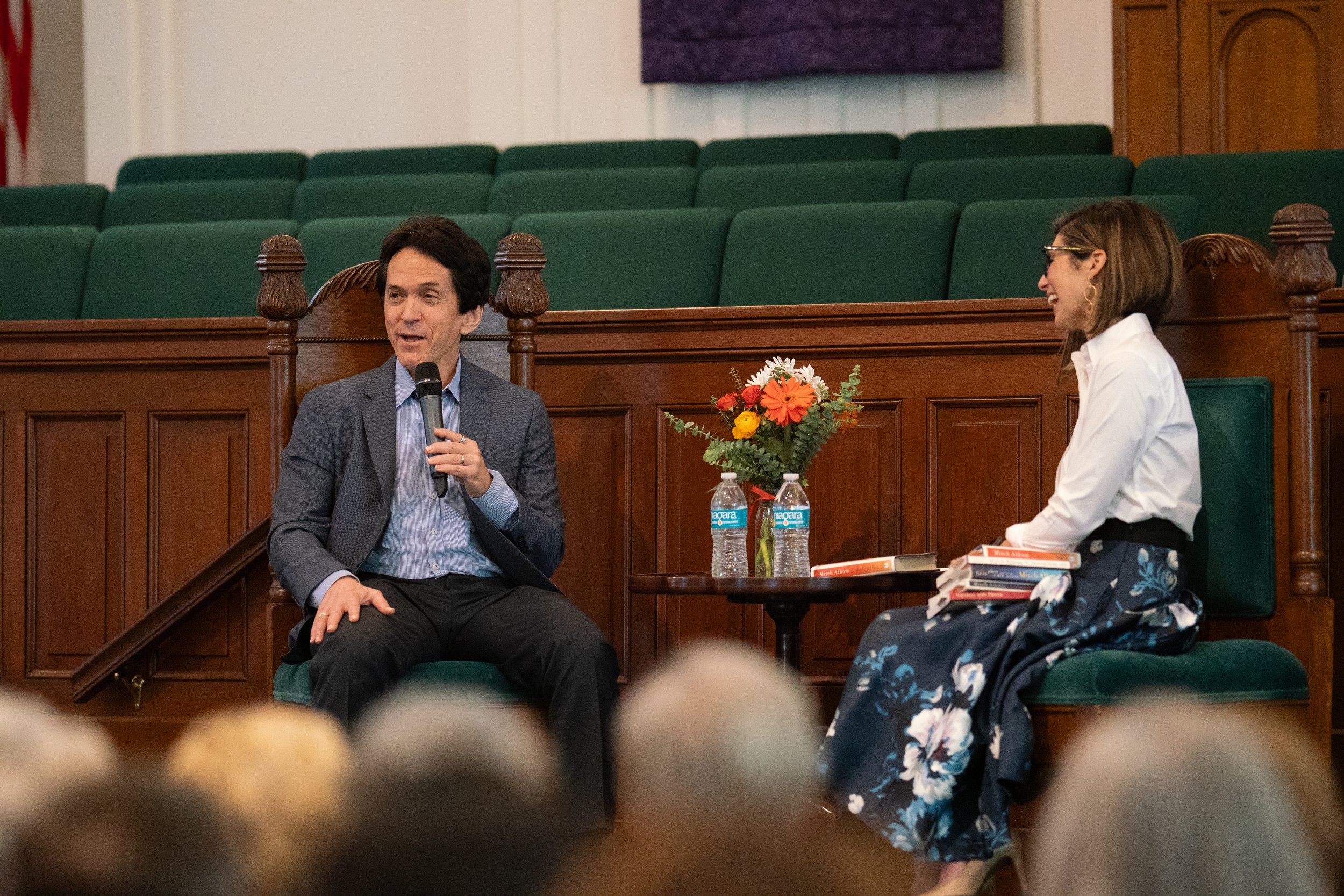
A Conversation with Mitch Albom on Truth and Purpose
What if truth could speak? Not metaphorically, not through human interpretation, but as its own entity—indignant, unyielding, and, above all, betrayed?
On March 15, 2025, Carrie Fox sat down with bestselling author Mitch Albom in front of a live audience at Grace United Methodist Church’s Faith in Action event to examine the anatomy of truth—how it bends, how it breaks, and how, in the hands of history’s most cunning deceivers, it can be weaponized.
Mitch, known for Tuesdays with Morrie and The Five People You Meet in Heaven, takes us behind the curtain of his latest novel, The Little Liar, a story where truth itself is the narrator. He unpacks the moment of inspiration—standing in Israel’s Yad Vashem Holocaust Museum, listening to a survivor’s voice echo through time. He shares his research journey from the streets of Thessaloniki to the darkest corners of human deception.
And he pulls no punches about the world we live in today—where lies are not just believed but preferred.
As much as this is a conversation about literature, history, even philosophy, it is just as much a conversation about faith—not the quiet, passive kind, but faith in action. Mitch talks candidly about his work in Haiti, the children he has come to love as his own, and the moral weight of decisions that shape their futures. He even gives us a glimpse into his next book, Twice, a whimsical yet profound meditation on second chances and their unintended consequences.
How do we cultivate truth? How do we resist the seduction of comforting lies? And, perhaps most poignantly, what does faith look like when it moves beyond words? In a world where deception is currency, the real question isn’t whether truth exists—it’s whether we have the courage to hear it.

Faith in Action with Mitch Albom
On the heels of the 25th anniversary of the book Tuesdays with Morrie, Carrie Fox sat down with Mitch Albom to discuss the power of storytelling to create empathy among people. This event was produced in partnership with interfaith organizations in Maryland to how a faith in action conversation. One of Albom's true gifts: to tell stories so deeply personal, so easy to project ourselves into, that we can't help but see ourselves in them. And once we're able to see ourselves in a story, or a pitch, or a release, we capture a spark of empathy to light the flame of change.
Mitch is a philanthropist, columnist, musician and sports reporter, whose books such as Tuesdays with Morrie and The Five People You Meet In Heaven have sold over 47 million copies, with translations in 45 languages. While he first became famous for his sports writing, Albom has become better known for the themes of hope and kindness that weave through his books, plays, and films. In his talks and presentations, he brings the same inspiring message of community building, giving, and purpose.
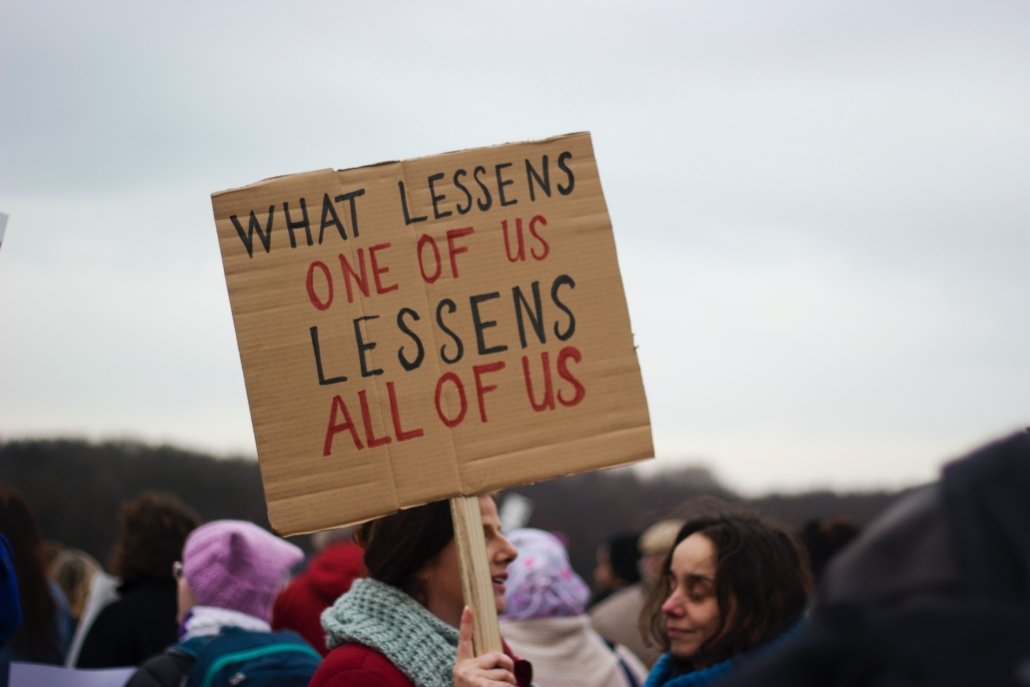
Promoting Equity Through Design
In our recent community conversation we looked at recent examples of how design has subtly (and sometimes not-so-subtly) perpetuated stereotypes, prejudices, and racism. Design is all around us and we all participate in the system as either creators or consumers, by learning how to think more critically about design, we can challenge societal norms in our own work.
Below is a list of resources, sources, and references we used in our presentation:
Universal Declaration of Human Rights
H&M Controversy and “Monkey Racism” History
H&M faced backlash over its ‘monkey’ sweatshirt ad. It isn’t the company’s only controversy | The Washington Post
Discrimination against blacks linked to dehumanization, study finds | Stanford News
Comparing black people to monkeys has a long, dark simian history | The Conversation
Now that Danny Baker’s been fired by the BBC, a brief history of ‘monkey racism’ | gal-dem.com
Kodak
How Kodak’s Shirley Cards Set Photography’s Skin-Tone Standard | NPR
How 20th Century Camera Film Captured a Snapshot of American Bias | TIME
A brief history of color photography reveals an obvious but unsettling reality about human bias. | UpWorthy
Color film was built for white people. Here’s what it did to dark skin. | Vox/YouTube
Cheerios
Vitriol Online for Cheerios Ad With Interracial Family | The New York Times
An American Family Returns to the Table | The New York Times
Barbie
Racist Figures
Quaker Oats to Retire Aunt Jemima After Acknowledging Brand’s Origins as ‘Racial Stereotype’ | Smithsonian Magazine
R.T. Davis Exhibit | Chicagology
‘Eskimo Pie’ Owner Calls Brand ‘Derogatory,’ Vows to Change Name | Rolling Stone
Inuit or Eskimo? Which Name to Use | Alaska Native Language Center
Indo-American Teens End Racist Logo of “Mahatma Rice” from Houston’s Riviana Foods | Indo-American News
The Red on Yellow — Chiquita’s Banana Colonialism in Latin America | David B Lauterwasser, Medium
From ‘NEVER’ to Name Change, How Dan Snyder Lost Redskins Battle | Newsweek
Maps
The True Size of Africa | Kai Krause
Are your maps racially biased? | The Concordian
Why Map Historians Are Annoyed With Boston Public Schools | Atlas Obscura
The Problem With Our Maps | Visual Capitalist
Diversity, Design, and Bias
More Evidence That Company Diversity Leads To Better Profits | Forbes
equityXdesign | Medium
A brief history of how racism manifests itself in design and how we can learn from it. | UX Planet
W.E.B. Du Bois’ Visionary Infographics Come Together for the First Time in Full Color | Smithsonian Magazine
The designer who illustrated racism, inequality, and black life in America, 120 years ago | Fast Company
Book of W. E. B. Du Bois’s Data Portraits | PA Press
Harvard Implicit Bias Test | Harvard
Implicit Biases toward Race and Sexuality Have Decreased | Scientific American
Combatting Unconscious Bias in Design | UX Design
Why We Need Universal Design | Michael Nesmith, TEDxBoulder
The 7 Principles of Universal Design | National Disability Authority
Design for Diversity™(D4D) Framework | Inkblot, The Creative Independent
Organizations working to increase representation:
AIGA DC Design Continuum Fund (or the scholarship for your local AIGA Chapter)
Stock Resources
Tetra Images (purchased Blend)
Creative Commons (Be aware of copyright issues, the need for model releases, etc. Always read and follow the end user license agreement)

Using Business as a Force for Good
By: May Robinson, Mission Partners Director of Community Engagement
Recording of “Using Business as a Force for Good”
Highlights from “Using Business as a Force for Good”
On August 20th, we brought together our Managing Director, Jessica Hassanzadeh, our Chief Operating Officer, Bridget Pooley, and B Local Mid Atlantic Chair and Council Fire CEO, George Chmael to facilitate a group discussion on how to harness business as a force for good by centering purpose, people, profit, and planet.
A few key takeaways from this rich conversation include:
Lead with your values. Assess the intersection of what you love, what you’re good at, what the world needs, and what you can get paid to do to identify your individual and company core values.
When you deeply understand your social, environmental, and economic impact and begin measuring your impact, you can focus and strengthen your ability to drive intentional, purpose-driven outcomes.
In order to solve both historical problems (systemic racism) and new problems (the global pandemic), we need to reset capitalism and shift toward a shared wealth mindset.
The original purpose of corporations was to serve people, and we need to become people-centered again.
You don’t have to compromise profit. Often, centering purpose can pay off even greater in the long run.
Resources Shared:
What’s Next?
At Mission Partners, we are intentional about centering people, purpose, and planet over profit. Drop us a line if you are curious about how you can be purposeful in shifting your organization and the way you approach business, and how we may be a resource in your journey to strengthening your social impact and harnessing business as a force for good.
View details and register for future community conversations.
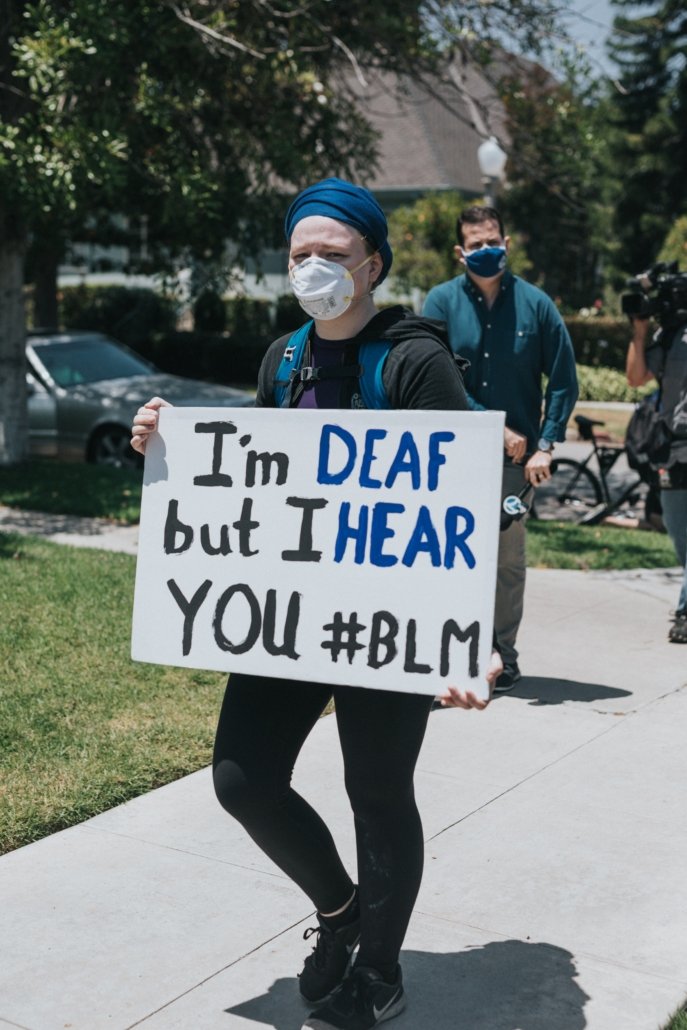
Building Trust and Empathy in Communication
By: Amira Barre, Mission Partners Research and Engagement Coordinator
Recording of “Building Trust and Empathy in Communication”
Highlights from “Building Trust and Empathy in Communication”
In our last community conversation on impact investing, we discussed the importance for business leaders to have a values-centered approach at driving equitable outcomes by putting money where their heart is. This segued into our next conversation with Jeremy Fletcher, Assistant Professor at the University of South Alabama and Veteran Peer Support Advisor. He pulled from his lived experiences growing up in poverty and throughout his life—in the military and in sports—to influence the values of trust and empathy, which he says should be at the core of all Justice, Equity, Diversity, and Inclusion (J.E.D.I.) work.
Here is a recap of this community conversation hosted on August 6 titled Building Trust and Empathy in Communication.
Shared Trauma, Collective Healing
It takes just one adverse childhood experience to lead to tremendous implications for health and mental health, and if these traumas aren’t addressed, it will lead to a cycle of generational trauma. We see this happening on a large scale right now in our country due to the generational trauma caused by centuries of anti-Black systemic and structural racism. Trauma is a shared experience. The levels to which we each have experienced racial trauma certainly are not the same, but each and every one of us has some sort of trauma based on our individual experiences and identities. While the trauma and healing may look different for each of us, the commonality is the need for trust, caring, compassion and understanding in order to heal. We can all use shared experiences to build these bonds of trust.
The lessons we can learn to experience healing are to:
Realize that pain is a very real human experience;
Understand healing best occurs in the context of a relationship with other people, and people who feel isolated will experience a greater degree of suffering; and
Our humanity is universal.
Connecting the Heart, Mind, and Senses
The existing disconnect between many issues and solutions we attempt in our J.E.D.I. work is that we are not leading from the heart, mind, and senses. As leaders, if we aren’t taking the time to explore the inconsistencies between our own values and actions, we will be perceived as dishonest, and honesty is the root and basis of trust. We must first explore our own values and decide which actions align with those values. This work engages deep emotional levels that cause us to examine our core identities, and it takes courageous efforts to delve into our own trauma and the trauma of others with the intent to grow and expand. When we are connected to our heart, our mind will follow.
If we think about these terms like the heart, mind, and senses of an organization, it would look like the following:
Heart: Values
Mind: Strategy
Senses/Nerves: Community Connection
The question becomes, are you integrating your strategy with what you hear and learn from the community you are working with? Emotions are the energy of change, so choosing actions that deeply connect with our internally driven motivation is ultimately the work that we must engage in. When we engage in this work, we can relate to those who have suffered, and that is the basis of empathy.
The Importance of Word Choice
The words you choose to communicate with your audience can increase trust between you. Whether you have a successful conversation or a missed opportunity is largely dependent on how much your audience trusts you. You first have to understand your audience, their values, and what’s important to them to build credibility and establish trust. People tend to respond favorably when you choose strength-based language vs. deficit-based language, but they will definitely listen if you are speaking their language. For example, if your audience is a group of competitive, athletic, and prideful people, you may have more success talking about “performance optimization” rather than “injury prevention,” while the content of your message may be the same, the words you use to describe the same process are different. One set of words is perceived positively by this group (performance) vs. the latter (injury), which is something they may not even think is relevant to them.
The key is to toe the line between progress and reality. In J.E.D.I. work, we have come a long way, but we are far from finished. By meeting your audience where they are, you might open up avenues for conversation and common understanding.
A Path Forward
We all have inner work to be done. A path forward requires steps toward opening up to your difficult thoughts, sensations, and allowing you to be present. This allows you to feel and experience everything—the good, bad, and ugly—while still living in reality. Those moments of tension and pressure and the difficult conversations around racism and structural change are part of the path forward and should not deter anti-racism work.
Resources Shared:
What’s Next?
At Mission Partners, we are intentional about centering the J.E.D.I. principles of justice, equity, diversity, and inclusion in all we do. We conduct regular reviews and updates to our own policies, practices, and messaging to ensure we are doing our part to advance equity within our organization. We have also helped other organizations improve their communications to become more equitable and inclusive and are currently building a “Race and Communication” workshop. Contact us today to chat about how we may be able to help your team.

Where Ethics and Persuasion Meet
By Dionne Clemons, PhD, Mission Partners Expert in Residence, Strategic Communications
For more than 15 years, I taught undergraduate and graduate public relations students the theoretical and practical foundations of strategic communications management. One of my favorite lessons to teach was on ethics and the importance of being an ethical advocate for the organizations my students would serve. I would explain what being an ethical advocate meant by reminiscing about the good old days of working in public relations and having to tell my boss that no, they can’t deny families with school-aged children access to the housing development being built; or yes, we’d have to get trademark approval from a brand to use its likeness in our promotional materials.
Having toggled between academia and practicing strategic communications, I understand the role that communicators play as ethical advocate.
Case in point, while serving in a senior level communications role for a social service nonprofit, our executive director directed my staff to secure our customers’ job offer letters with their salaries so that we could promote the success of our job core program. Our customers were more than willing to share their offer letters to us. But since offer letters include personal information such as salary and benefit information, it was my difficult job to inform the executive director that we would not be asking our customers to give us this private information; explain the privacy concerns around this ask; and present an alternative promotion of job core program’s success.
Every day it seems, as public relations practitioners, we are the ones who are our organizations’ dream killers. Often, our leadership thinks our only job is to convince donors, volunteers, constituents, or other stakeholders to donate, to volunteer, or to follow – through the messages and images we conjure up. But in real life, we walk a fine line between advocating for our organizations, their missions, visions, and values; and protecting and giving voice to our organizations’ audiences.
Our job is also to take professional responsibility to understand the opinions and interests of our organizations’ stakeholders—employees, volunteers, board members, policy advocates, and most importantly, the people in our communities—and to take them into consideration when decisions are being made on their behalf by our organizational leaders. Although public relations practitioners work to serve the client, excellent practitioners recognize that when stakeholders’ opinions and interests are considered in the decision-making process, the outcome is mutually beneficial for the organization and its audiences. Ethical persuasion is defined as the ability to, “treat others with respect, understanding, caring, and fairness; to explore the other person’s viewpoint, explain your viewpoint, and create resolutions.”
Public Relations or Propaganda?
Well, it depends. I often say that the difference between public relations and propaganda is where one’s values lie. As a public relations practitioner, I am highly skilled at using timing, research, statistics, stories, framing imagery and language to persuade a person to believe what is being presented. Our moral principles—what we believe to be rules of right conduct—guide our decisions when we apply all that we know to create content designed to persuade our audiences’ attitudes, values or behaviors. Having the skills to persuade is such a powerful tool that we must act in accordance with a personal code of principles, as integrity is one of the cornerstones of ethical behavior.
We can refer to many examples in media where organizations make poor communications decisions for the sake of profit only to be publicly shamed and forced to apologize as a result of the backlash. Changing how content is created starts with our understanding of the powerful role we play in shaping messages and what we are accountable for within these roles.
Responsible Advocacy Theory
Since 2000 Edelman global public relations has released its Trust Barometer. In 2020 its findings reveal that an organization’s ethical behavior determines whether or not their audiences trust them. Every day we have the great privilege and responsibility to create media that will be consumed, believed, shared and possibly acted upon. The Responsible Advocacy Theory explains that within public relations, practitioners must compare the harm and benefits, respect others, guarantee the public interest, safeguard human dignity and maintain justice in communication. When we as public relations practitioners frame our work through the lens of responsible advocacy we become better servants to our clients, their stakeholders and ourselves.
The T.A.R.E.S. Test
The T.A.R.E.S. Test is a five-part test that came out of a body of research that studied public relations ethics. These guiding principles can help us when we are making decisions on when and how to persuade:
Truthfulness of the message;
Authenticity of the persuader;
Respect for the persuadee;
Equity of the persuasive appeal; and
Social Responsibility for the common good.
With each strategy developed, every image selected, and any message crafted, we as ethical advocates must put our work through the TARES test to ensure ethical efficacy.
Ethics in Action
Nearly 30 years ago Dr. James Grunig, University of Maryland Professor Emeritus and public relations theorist, and a team from the International Association of Business Communicators, began to develop what is now known as, “Excellent Public Relations.” These researchers wanted to know the value of public relations and communication to an organization.
The Public Relations Society of America’s Code of Ethics and the International Association of Business Communicator’s Code of Ethics echo the principles of Responsible Advocacy Theory and of the TARES Test, serving as additional resources to reinforce the importance of ethical advocacy within the communications practice.
The Mission Partners’ team is committed to adhering to ethical public relations decisions and working with integrity. Our company values lie at the core of all of what we do.
As communicators if we want to make a difference and affect change for our clients, that work begins with our deliberate effort to guide ethical decision making and to produce work that is for the common good and has societal value.
Continue the Discussion with Dionne
We invite you to formally meet Dionne and continue the conversation on Thursday, November 12 at 5 p.m. ET for our Community Conversation with her, where we will dig deeper into what it means to be an ethical advocate—for both our organizations and our audiences. Register here.

The Economics of Inequality
By: May Robinson, Mission Partners Director of Community Engagement
Highlights from “The Economics of Inequality”
In our last community conversation on race and humanity in the workplace, we emphasized the important step for individuals and organizations to first look inward to understand their roles in maintaining privilege, power, and racist systems and structures. Before we can dismantle white supremacist systems, we must understand our roles in these systems. This led us to our most recent conversation with impact investing expert, Karen Wawrzaszek, on the power that business leaders and philanthropists have to drive the J.E.D.I. principles of justice, equity, diversity and inclusion through how they use, spend, and save money—whether they are intentionally purposeful or unintentionally perpetuating harmful inequities.
Here is a recap of our sixth community conversation hosted on June 25 titled The Economics of Inequality.
On Investing
Currently, there is a large wealth gap and long-standing financial inequities established during the War on Poverty, which make it difficult for people living in poverty to escape it. While there is a long history of efforts to address poverty in the U.S., the data shows we have barely moved the needle on closing the gaps, especially for the Black and Brown communities.
Investments are affirmations. To minimize financial inequality and shrink the wealth gap, rethink how you invest your money. Previously, investors only looked at financial returns, but now, you should consider everything that makes a company profitable—financial and social returns.
Put your money where your heart is. Align your investments with your mission and values. Impact investing, also known as Environmental, Sustainable, and Governance (ESG) investing, allows you to intentionally put money back into your community by investing in organizations that benefit the community. For example: Is the organization paying living wages? Are they hiring a diverse workforce? Are they promoting and elevating the voices of Black and Brown employees? These are all social returns that create a more equitable world. If you commit to only investing in companies paying fair wages, you will help others build wealth.
Reframe how you think of stakeholders. Wealth disparity grows when you only have one stakeholder—the investor. Expand who you believe you are impacting when you invest in a company—its employees, supply chain, and community. Invest your money in the companies that are also investing in their larger community and helping their employees build wealth through fair wages, retirement plans, and healthcare and childcare benefits.
The Triple Threat of Inequality
We are worse than when the War on Poverty started fifty years ago. If we inflate and adjust the poverty gap, it is worse than it was fifty years ago. These are the systems that affect the most people living in poverty:
Education: Currently, funding for schools is inequitable because it is based on property taxes. Resources are not fairly allocated to all students because students in wealthier communities often have better resources. One example of the broken educational system during COVID-19 is that all learning transitioned to distance-learning. Many students living below the poverty line did not have access to broadband Internet or reliable devices.
Workforce: Our society must change the way we view success. Due to the very high cost of higher education in the U.S., people living in poverty have less access to completing college degrees. College degrees are not the only option for career development as there is also a lot of value in apprenticeship programs. Apprenticeships can help people build the skills needed to acquire higher wage jobs, without incurring debt from a college degree. We should invest in organizations that are offering apprenticeships and those that value these alternate paths to success, which will allow people to advance their careers and continue to build wealth.
Healthcare: For employers, offering quality healthcare plans to their employees is one of the greatest wealth-building benefits. Healthcare costs are expensive, and without employer benefits, many people cannot build their wealth due to a large percentage of their income being allocated to healthcare premiums and services.
Calls to Action
We are upholding white supremacist systems within our organizations. Whether we realize it, many of our organizational policies and practices are rooted in white supremacy. Take some time to take a look at your existing policies and practices. Then, get to work on purposefully changing problematic policies and practices.
Hire and support a diverse workforce. This allows you to get in close proximity with people who may not look like you, live like you, or experience life like you. It’s important to consider diverse perspectives when developing 401k offerings, health plans, and other benefits and policies needed to help your employees grow their wealth. Their needs may be different than your needs, and it’s important to understand this as you shape your policies and practices to become more equitable. In addition to hiring, ensure you are creating a culture that ensures your Black and Brown employees feel valued and supported in their career growth.
Assess all the people your business touches. Everyone around you—employees, contractors, clients, vendors and suppliers—should all align with your values.
Consider impact investing for your 401k program. This will make sure that not only are you creating wealth-building opportunities for your employees through a 401k program, but you are also investing your dollars back into the community for social returns. Choose to only invest in organizations aligned with your own mission and values.
Offer healthcare and/or childcare benefits. Healthcare and childcare are two of the largest costs for American families, outside of housing. Offering some kind of healthcare and/or childcare benefits will support your employees in building wealth because these are dollars they can reallocate to their 401k, savings, or other investments back into their families and communities.
What’s Next?
At Mission Partners, we are intentional about centering the J.E.D.I. principles of justice, equity, diversity, and inclusion in all we do. We conduct regular audits and updates to our own policies, practices, and communications to ensure we are doing our part to advance equity within our own organization. We have also helped other organizations improve their own policies, practices, and communications, as well as facilitate trainings on how to create more equitable organizations and messaging. Contact us today to chat about how we may be able to help with this process.

Race and Humanity in the Workplace
By: May Robinson, Mission Partners Director of Community Engagement
Highlights from “Race and Humanity in the Workplace”
Earlier this year, we planned The Business Case for Racial Equity, a community convening in partnership with the W.K. Kellogg Foundation (WKKF) and Leadership Montgomery, inspired by the WKKF report of the same name. Due to our global pandemic, this event was postponed. However, race equity remains our top priority, and centering ongoing dialogue on issues of justice, equity, diversity and inclusion are central to that priority.
When we first planned last week’s virtual community conversation, it was around the time that the murder of Ahmaud Arbery gained national attention. Internally, we were already reflecting upon the past and current commitments of Mission Partners to advance racial equity within our organization, our communities, and the world. While we have spent the last several years working on weaving racial equity into our work, we still have a long way to go to become an anti-racist organization. Were we bold enough in calling out and standing against racism? Were we making an impact in our communities beyond education and awareness? And were we willing to prioritize anti-racism actions above feelings of discomfort and fragility? While we reflected on how to commit to more actions to dismantle white supremacist systems, our country then witnessed the murders of Breonna Taylor and George Floyd, among a long list of other Black men and women unjustifiably murdered in America for centuries. Following these recent murders, the #BlackLivesMatter movement gained global support, with the worldwide June 2020 protests against American police brutality being called one of the largest Civil Rights protests in world history.
This brings us to Thursday, June 18, 2020. We invited racial equity professional and Mission Partners consultant, Carolyn Lowery to join our CEO Carrie Fox for an open dialogue on race in the workplace. The following is a recap of this conversation. Our intention is that this conversation can inspire attendees to keep the conversation going with their colleagues, partners, family, and friends.
Statements Are Great, But Action Is Better
There is a mindset shift occurring, with many people looking outside of individual instances of racism and now seeking to understand the deep-seated racism built within our systems. For some people, this conversation isn’t new. Many business and community leaders have released bold anti-racist statements and commitments, but outside of talking about racism, what actions can people commit to actually change oppressive systems?
First, Acknowledge and Reflect On This Moment
Conversations on race can be hard, but they don’t need to be intimidating. Before starting any conversation, consider why this moment feels different and what you will do about it. Understand that nothing is new about the racism of today; the only thing that is different is the increased awareness by people who are not directly impacted by racism. White people can no longer ignore racism. Understand that communities of color have endured racism for hundreds of years, so it can be painful to watch new people come to terms with the realities of racism for the first time.
Do the Inner Work
Before we can tackle interpersonal and systemic racism, we each must reflect internally about the role we play in issues of race and racism. This requires introspection and reflection. Some easy first steps in completing this inner work include:
Accept that trauma, pain, and fear will be part of the process. Anti-racism work is a lifelong journey, so take breaks to limit your own trauma, pain, and fear.
Be aware of your own biases and seek to understand why they exist.
Practice empathy.
Establish Grounding Commitments
When you are ready to bring the conversations to your workplace, it is beneficial to establish grounding commitments together as a group. Some that we suggest are:
Willingness and Flexibility: It is critical to understand that developing a framework is a process. Understand and plan for how to manage anger and other hard emotions. Anti-racism work doesn’t come with a timeline. It is a journey, not a destination. Be flexible to breaks and shifts needed to manage the tough feelings that come with the work.
Humanity: What does a human need to be successful? Accept there are multiple ways to get work done through innovation and creativity.
Trust: This needs to go both ways.
Vulnerability: Rumble with vulnerability. We need to feel comfortable challenging each other and boldly speaking out.
Just start and do the work: Unlearn to relearn. It is a lot of work. It is tiring. It can be overwhelming to know where to start, but just start somewhere and know you will stumble along the way. It’s okay.
Be a Changemaker
At Mission Partners, we are avid followers of The Management Center, which recently published five points in applying an anti-racist framework to your organization:
Acknowledge and learn from past harms and inequities.
Root out existing inequities inside your organization.
Make specific, concrete, and outcome-driven plans to address inequities.
Make challenging anti-Black racism part of everyone’s job description—starting with your own.
Don’t make promises you can’t keep.
Other Resources
Some resources shared during this conversation to start your own inner work include:
Ready to Bring This Conversation to Your Team?
Our team has facilitated several virtual sessions through COVID-19. We are currently developing a Race and Communications workshop, which can be conducted virtually or in-person, to help your organization and team practice anti-racism through your internal and external communications. Contact us today for more information.
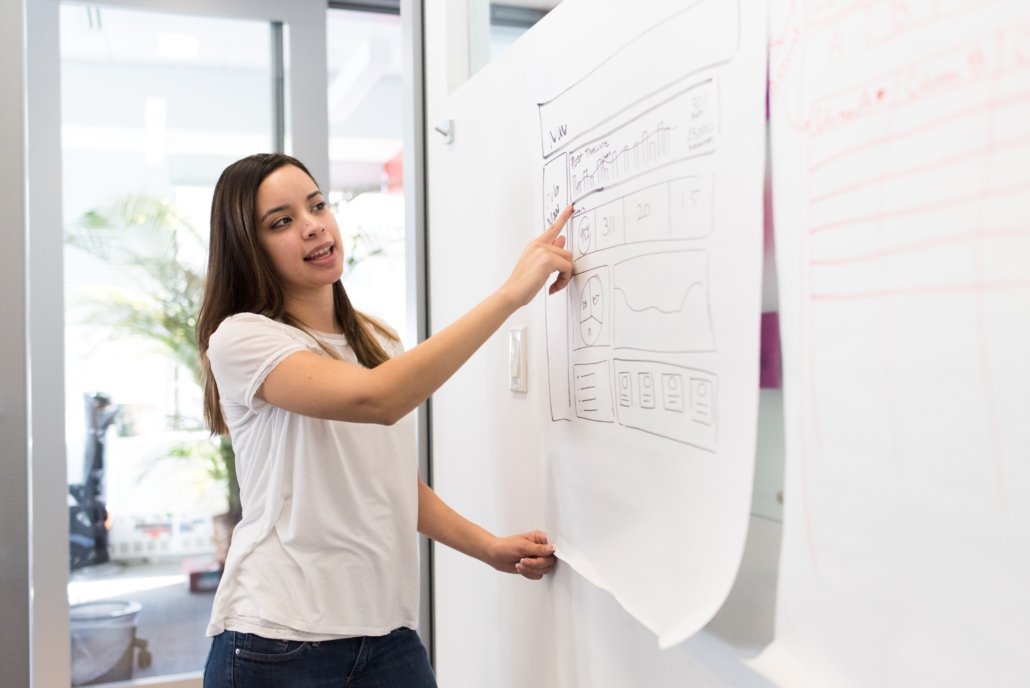
Beyond COVID: Systems Change is People Change
By: May Robinson, Mission Partners Director of Community Engagement
We are nearly three months into one of the most trying times of our lives. There isn’t one aspect of our lives that COVID-19 hasn’t touched—our workplaces and the way we show up at work, for our families, our communities, and our world. COVID-19 has especially exacerbated the broken systems that exist in the United States and make it even more pertinent to center race equity in all that we do. At this point, it’s clear there’s no “going back to normal,” there’s only thinking ahead to what our future may look like.
To find some clarity during these times of great uncertainty, our CEO Carrie Fox sat down to speak with futurist Eric Meade to find out how scenarios-planning can help organizations and leaders think beyond the pandemic.
The following is a recap of our fourth community conversation hosted on May 28 titled Beyond COVID.
Lead with Principles
When we don’t know what lies ahead, crossroads decisions help us to chart a path forward. In considering the effects COVID will have on our workplaces, on our industries, and on us as leaders, we need to think about how to respond by looking internally and considering:
What do I really care about?
What do I want to be true in my future and in my community’s future?
Principles are what we will discover from asking ourselves those questions. Most strategic frameworks our organizations currently use lead with goals and objectives. As we’ve all experienced during COVID, goals and objectives can change as our situations change. Unlike goals and objectives, principles are timeless statements that can be applied in any potential future scenario. Principles guide leaders, who are having to find the balance between making short-term decisions based on near-term benefits vs. long-term sustainability. Leading with principles makes it possible to sustain us both in the short-term and long-term.
A Strategy for Scenarios-Planning
Scenarios-planning takes contingency-planning a layer deeper and will help us make it to the other side by tapping into our Post-Traumatic Strength instead of Post-Traumatic Stress. We are all going to feel trauma and emotions tied to this pandemic. These uncertain times cause a lot of emotions to come out, and scenarios-planning uses this energy and creates a safe space to examine our options and answer the question: What can we do now?
There are three scenarios to consider as possible futures to guide us:
Expectable Scenario: This is the future others are predicting as the likely future based on trends.
Desperate Scenario: This is the future with many challenges and may be the least desirable future, in which you might not overcome.
Aspirational Scenario: You should think of two different aspirational scenarios. These are potential futures where there’s enough good beyond what people expect is possible, without being utopian.
Scenarios-planning allows you to engage with the uncertainty and consider how you might be successful in each of the possible future scenarios. You can’t predict which future is going to actually happen, so don’t focus on one possibility over the other. Allow each future to exist and think of how you might respond and move in different directions, depending on how things unfold. You might find a strategy that you’re not currently using that would work in three out of your four potential scenarios, so do it!
The Future is Only a Guide for What You Need to Do Today
If you lead with principles, the future only serves as your guide to reach your desired outcomes. If you become so obsessed with a bright future or so obsessed with a worst case scenario, you will miss things you could do right now to shape a more positive future. Plan for the future you want, but prepare for the future that you don’t. Recognize that you can’t control outcomes, but your principles can guide you through any scenario that can lead toward your desired outcomes.
Innovations Are Born in Times of Crisis
If you recall all of the times our lives and our society have transformationally improved, it is typically in times of crisis. These are the times for growth and provide a spotlight on what’s not working in our lives, in our organizations, and in our communities. These are the times that spark change toward a better future. This is a big opportunity for individuals, organizations, communities, and society to look at our past and current assumptions, behaviors, and attitudes, and make the changes necessary.
Systems Change is People Change
One of the pieces that kept returning in this conversation was the responsibility of individuals to make the changes we want to see within our organizations and communities. Change happens one person at a time. This evolved our conversation from not just what can be done within our organizations, but what can be done in our communities.
As we were engaging in this conversation of how to change systems to sustain beyond COVID, we couldn’t ignore the events that were unfolding around us in response to the racism built into these very systems. The disproportionate impacts of COVID-19 on the Black community, the unjustified murders of George Floyd, Breonna Taylor, and Ahmaud Arbery, and Amy Cooper’s racist attack all put America’s racial inequities on display for the world. During this community conversation, we recalled a recent quote from Michael Sorrell, President of Paul Quinn College: “If we really cared about equity, we would have done something about it already.”
Often when we talk about systemic failures, the humanity of the system gets stripped away. We forget that we are the system. We need to want to change enough. When people change, the systems will change.
We hold Sorrell’s quote even closer now as we realize that we have a great responsibility as business owners, community leaders, and allies. It is not enough to just speak about racial equity and center equity in our businesses. We must take bold action—in our organizations, in our communities, and as a society—to dismantle white supremacy.

Balancing Parenting and Productivity
By: Arron Neal, Mission Partners Chief Strategy Officer + May Robinson, Mission Partners Director of Community Engagement
The balancing act that parents perform between achieving at work and spending quality time with their family has always been a challenge. That challenge has been compounded during the last several weeks as families now grapple with working from home with children in tow and under quarantine.
Some parents have found themselves working around the clock to meet the needs of their employer, their clients, children, partners, other family members, and even their communities. As our homes and work spaces literally become one, we invited community members to come together to discuss what it’s now like to be a full-time parent and productive professional during a pandemic, including what we’re learning, what’s challenging and where we’re succeeding.
The following is a recap of our third community conversation hosted on April 30 titled Balancing Parenting and Productivity.
Unique Situations Require Unique Approaches
In addition to the shared challenges of finding time for self-care, combating feelings of guilt, and juggling the competing needs of others, many parents also shared how difficult it is to keep up with both required and suggested enrichment activities for their children. Parents of school-age children are being asked to participate in Zoom classroom experiences and parents of babies and toddlers feel pressured to come up with creative and engaging activities to fill their children’s day. Some parents said they simply do not have the resources or supplies needed to participate in certain learning activities.
Among the insights and solutions shared to help parents survive and thrive during our current challenge were:
Find new ways to learn. You are not your child’s teacher, and that’s okay. Teachers play a special role in the lives of our children and replicating that experience is hard to do at home. Instead of trying to match the school structure, consider teaching through experience. Baking, preparing meals as a family, doing small home repairs, operating new tools, and going for nature walks can provide valuable opportunities for learning and life skills development.
It’s okay to just play. Spending quality time with your family is the most important thing you can do for yourself and each other during these uncertain times. Enjoy this time by playing board games, coloring, reading, dancing, laughing, and just being together.
It’s okay to ask for help. If you can, lean on your partner or your team at this time. If you need a moment to be alone and breathe, tell others. If you find you’re unable to work at the same pace and you need to reprioritize your tasks or time, communicate that to your team. If you need to step away from work to manage your family, keep those who rely on you informed.
Set boundaries and compartmentalize. Working all day and night is unsustainable. Now is the time to be realistic about how much time you can truly dedicate to get things done each day. Create a short-list of tasks each day to hone in on your real priorities. Set aside time for work breaks, mealtimes, walks, and other activities that will keep your family healthy and support your productivity. Set a hard start and end time to your work day, just as you had when you were in the office. Update your work and family calendars, so everyone is aware of your hours and set auto-responders and away messages, if needed, to be transparent about when you are working and when you are with family.
Create a routine. Consider starting your day with a short walk, whether it is alone as a form of self-care or together with your family. Sticking to a schedule can also help to create a stress-free environment and help children feel secure in knowing what to expect in their day. Prioritize and schedule family time as part of your calendar so you have something fun to look forward to each day or week.
Give Yourself Grace
As much as we’d like to do it all, it’s becoming increasingly apparent that this is not a sustainable way for our society, families, and businesses to thrive long-term. Remember that nothing about our current situation is normal. We cannot expect our parenting and work productivity to also be normal. Above all, take care of yourself. You cannot take care of others or find productivity when you are not well.

The Importance of Self-Care and Wellness
By: Bridget Pooley, Mission Partners COO + May Robinson, Mission Partners Director of Community Engagement
“When we don’t take care of ourselves, we pay a price — especially during this crisis: innovation, creativity, resilience, empathy, decision-making and team building are the first to disappear when we are burned out and depleted.”
The new normal is weighing down on many of us. We are living in a period of grief, uncertainty, loss, instability, and great transition. Any one of those experiences alone is enough to require additional self-care but the combination of everything together makes it even more critical that we make time for ourselves. With this in mind, Mission Partners has found new ways to prioritize our team’s self-care. We developed additional emergency benefits, including the increase of paid time off (PTO) hours that are specifically available during the mandated stay-at-home period to encourage team members to take mental health days. Because of our commitment to mental and physical wellness, we wanted to bring our community together to share additional tips to heal our minds, bodies, and spirits.
Below is a recap of our second community conversation on April 23 titled The Importance of Self-Care and Wellness.
Overcoming Challenges
The biggest challenge people who struggle with self-care have is putting the needs of family, friends, coworkers, and bosses before our own needs. A couple of reasons why we must stop putting our own needs aside:
Physical, emotional, and cognitive stress are linked: If you find yourself hitting roadblocks at work or being irritable toward friends and family, it may be because you are not properly taking care of yourself. Your mind, body, and spirit are all linked, so you must replenish each of these to show up as your best self everyday. If one thing is off balance, everything else will become imbalanced.
Without a stable foundation, you won’t be productive: The imbalances created when you aren’t taking care of yourself will cause a lack in productivity, motivation, and even your ability to care for others.
Self-Care Strategies
It’s healthy to remember that we don’t need to tackle self-care all at once. If we can do one small thing for ourselves each day, we will get closer to restoring balance. Here are some simple strategies for you:
Just breathe: Take a deep breath. Recognize that you are here. You are still standing. You. Are. Here. “Someone asked me the other day why I wonder so much about breathing. It’s a thing we just do naturally and I said yes, and even though we do it, we do not all do it well. We do not breathe deep and true in a way that feeds our bodies, hearts, and lives.” -Brian Andreas
Develop a routine: Take a little bit of time during your evenings to plan your activities for the next day. Go to bed early, so you can wake up early and have focused time to pray, meditate, or go outside to ground yourself before tackling the day’s tasks.
Fuel your body: Remember to eat healthy meals and snacks throughout the day. Build time in your work schedule for these important meal breaks. You may also consider a temporary fast to physically and spiritually detox.
Get moving: This can be a simple stretch, a short or long walk outside, a run, a virtual fitness activity, or even dancing. You can start or end your day with movement, or take movement breaks throughout the day.
Change your environment: Add things that make you happy to your working space: aromatherapy with candles or essential oils, artwork, plants, or anything else to brighten up your home office. You can also change your environment by going outside in the middle of the day to refresh.
Find ways to connect with others: While you can’t physically be together, find a way to connect with your loved ones everyday through a daily family joke thread, videos, or even just having breakfast together as a family or lunch with your dog.
Choose Joy
Accept the things you cannot change, but acknowledge that the one thing you have control of is your ability to choose joy everyday.
Write a love letter to yourself: Remind yourself of your beauty, talents, your big wins, and everything you bring to this world.
Practice gratitude: Think about one thing you are grateful for each day. Maybe it’s the family and friends you have had more opportunities to connect with each day, or if you live with others, relish in the little moments you share with them now.
Be present: Don’t multitask. Turn off your social media or text notifications while you are working. Close your work laptop when you are with family. Be present, even when you are outside. Stop and look at the flowers, the trees, and the animals; appreciate the unique smells, the sensation of your feet hitting the ground beneath you, and the warm (or cold) breeze blowing through your hair.
Be intentional: Schedule time in your calendar for yourself. Consider using the timer feature in your phone to take a five minute break every hour to stretch, do desk yoga, or just breathe. Use a whiteboard to cross items off of your Self-Care To Do List everyday. Consider creating a vision board dedicated only to self-care, so you can remind yourself to make the space in your life for self-care.
Get rid of the noise: Unplug sometimes. Turn off the screens. Don’t consume as much news. There’s a lot going on in this world. It’s okay to ignore it sometimes (or a lot of times) and just be still and relax.
Do something kind for someone else: The joy we feel when we bring joy to others is a unique kind of self-care. Reach out to a friend who lives alone, send a care package to an essential worker, or create art for a family member.
Additional Resources
Some our community has found especially helpful include:
Happy Not Perfect (phone app for mindfulness)
Insight Timer (phone app for meditation)
The Mind Body Academy (podcast)
Self Care Prescription: Powerful Solutions to Manage Stress, Reduce Anxiety & Increase Wellbeing (book)
Deep Work: Rules for Focused Success in a Distracted World (book)
Cosmic Kids Yoga (videos)
Join the Next Conversation
If you found value in these tips, we hope you will join us in our upcoming community conversations, where we bring together an intimate group of business and community leaders to exchange ideas on how we can get through this time together. Find details and register for upcoming virtual conversations here.
Past Community Conversations

Sunday Supper and a Show to Benefit The Theatre Lab
On Sunday, April 26, 2020 Mission Partners hosted a virtual fundraiser to support The Theatre Lab—Washington, D.C.’s largest and most comprehensive independent, nonprofit school for the dramatic arts.
At its core, the virtual event’s theme was: donation meets participation. As the DC community adapted to the harsh realities of COVID-19, many people were looking to connect with each other while social distancing. Our Sunday Supper presented a unique opportunity to create an interactive virtual fundraiser without sacrificing a meaningful audience experience. Prior to the show, participants were encouraged to order dinner from their favorite small business to help expand impact across the restaurant industry.
In total, Mission Forward® helped raise over $4,000 to support The Theatre Lab’s programming, operations, and staff during the COVID-19 crisis
“The event was more special than we ever could have imagined. We’re grateful to our friends and colleagues at Mission Partners for creating a wonderful event and including us as beneficiaries.”

How to Evolve Business and Development Strategies Through COVID-19
By: Carrie Fox, Mission Partners CEO + Jessica Hassanzadeh, Mission Partners Managing Director
In a COVID-19 world, our opportunities to connect with others outside of our current teams and family members are limited. People are seeking new ways to connect, network, and just talk with others. People are struggling with a variety of professional, personal, and health-related challenges, while navigating through the uncertainties of COVID-19. Many of us have developed strengths in certain areas that others desperately need help navigating, and it’s our time to share these tips with each other to help lift up our community during these tough times. Mission Partners will host weekly virtual community conversations every Thursday at 4 p.m. ET during this period of quarantine.
Below is a recap of our first community conversation on April 16 titled Shifting Your 2020 Business + Development Strategies During COVID-19.
Organizational Challenges
Organizations face a variety of new challenges in a COVID-19 world. These range to include:
Access to human capital: There is a dramatic reduction of people in the workforce and the number of volunteers but the number of people in need of assistance is increasing.
Shifting operations: It can be challenging to create digital services and shift from on-site operations to a virtual format. People are generally gaining comfort with digital services, but it can be difficult to deliver a high-quality experience and create the same meaningful, personal relationships.
Staff management: Some employees may be working longer hours, while some are now working shorter hours due to caregiving or homeschooling. There is a major shift in work/life balance that has yet to stabilize.
Tactics for Addressing Organizational Challenges
As you think about adjusting your business to overcome the challenges of COVID-19, it is important to figure out: How does the world need us to show up right now? What is the relevance for what you are doing at this time? Some tactics include:
Digital engagement: Begin to shift mainly to digital engagement through social media, video calls, and releasing digital content.
Taking advantage of accessibility: Take advantage of the reduced barriers to engagement. There used to be heavy planning and scheduling resources needed to connect in person. Now people are more willing to jump on the phone for a quick call and it can be easier to stay in touch.
Reframing the situation: A few months ago, Zoom may have seemed like a less substantive way to connect or a substitute for in person connection. But now you can think of it as an easily accessible way to stay in close contact.
Evolve as you think of a post-COVID-19 return: It is important to think about how we return differently. COVID-19 will fundamentally change the way things operate and as we adapt, we need to create space for conversations about how the pandemic will change work, fundraising, events, conferences.
Taking New Approaches
Innovation is often born during times of crisis. The following approaches may be helpful in rethinking how an organization can show up differently in a COVID-19 world.
Be creative about engaging volunteers: Perhaps shift operating procedures to involve donors in new, decentralized ways. Focus on restructuring volunteer activities so individuals can participate from their homes. Even if you can only recreate part of the volunteer experience in this way, it will still help you stay connected with supporters and possibly even create a broader reach than before.
Rethink fundraising, especially when it comes to events: Can you replace the product or service you were initially providing with a digital service? The goal is to raise money and people were open to giving initially – so it is important to find a way to refocus that generosity.
Stay in touch: Even if it is impossible to provide pre-COVID services during this time, staying in close contact with clients, donors, or volunteers can go a long way. There is an opportunity to provide information and support – not just services.
Find new ways to collaborate: How can you split resources and share expertise to create a new product or service that is tailored to the time?
Trade assets: Be creative in finding ways to move your mission forward without spending additional resources. If there are services you need for a project or new venture, trade assets with a service provider to offer them value in an innovative or non-traditional way. This could mean trading consulting services for graphic design services, or media training for copy editing. Find how you can leverage your strengths and exchange skill sets.
Silver Linings and Self-Care
It may be challenging to find silver linings during this difficult time, but creating space for gratitude, self-care, or wellness can benefit both you and your business. Common tactics include exercise, meditation, turning to faith, reconnecting with old friends or colleagues, taking walks, or exploring new hobbies. For some, COVID-19 is creating a swift pause that may provide the opportunity to recalibrate and fully prepare for the next endeavor.
Join the Next Conversation
If you found value in these ideas, we hope you will join us in our upcoming community conversations, where we bring together an intimate group of business and community leaders to exchange ideas on how we can get through this time together. Find details and register for upcoming virtual conversations here.
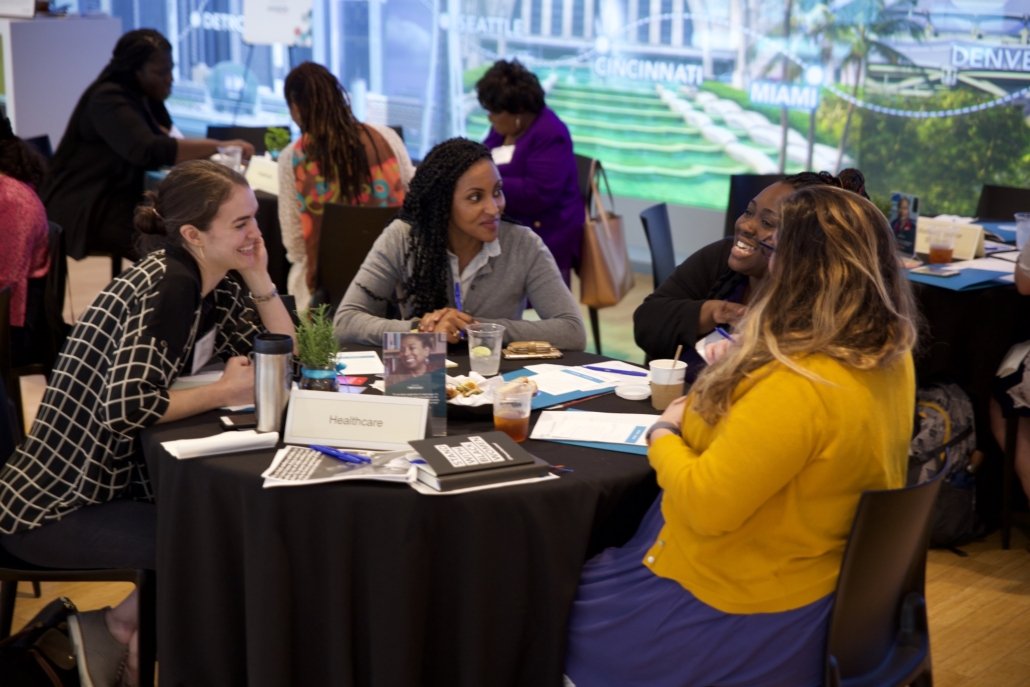
Hear Her: A Call to Action on Maternal Mortality
On May 20, 2019, Mission Forward® hosted Hear Her: A Call to Action on Maternal Mortality in the United States. This powerful community conversation centered on the soaring maternal mortality rates in the United States—especially among Black women. The panels were followed by an interactive community lunch designed to bring the conversation home, in a way that provided some basic tools to lead systems change efforts in our own communities through an anti-racist framework.
Despite boasting the highest rate of spending on healthcare in the world, the United States is the single most dangerous industrialized nation in which to give birth, with American women dying from pregnancy-related complications at alarming rates. And for Black women, the data is even more disturbing. In the U.S., Black Women are 243 percent more likely to die from pregnancy or childbirth-related causes.

Narrative Change
On November 16, 2018, Mission Forward® hosted an educational Fall gathering called Narrative Change which included a community lunch conversation + program which centered stories of immigration and people’s lives in the United States.
We heard from local youth leaders, award-winning journalists and various members of the community who brought necessary perspectives to some of the most prominent social justice issues of our time.
Participants were challenged to listen beyond their own social circles to hear from people who are not often heard in the mainstream. They were also encouraged to converse with other participants to learn firsthand from people in the community.
“Making connections with strangers at a personal level. Talking allows us to find common ground. I am working on two grant opportunities around community dialogue. This conference will help to shape that work.”
This event was presented in partnership with Montgomery College, the Greater Washington Community Foundation, and Bethesda Magazine.
Carrie Fox interviews award winning journalist Valeria Fernandez.
-
11:20 am | Registration
AFI Silver Theatre & Cultural Center
11:45 am | Community Lunch
Hosted by La Malinche Restaurant
1:10 pm | Welcoming Remarks
AFI Silver Theatre & Cultural Center
1:20 pm | Chapter 1: On The People in Between
An interview with American Mosaic Journalism Prize winner Valeria Fernandez
1:45 pm | First Person Point of View
A moderated conversation with several community residents about their American experience
2:30 pm | Chapter 2: On The American Experience
A group discussion with American University Professor, Author and CBS Political Commentator
Leonard Steinhorn and Mauricio Lim Miller, Mexican-American social entrepreneur and author
3:00 pm | Chapter 3: On Power
A call to action with Anand Giridharadas, author of the new book Winners Take All
3:45 pm | Community Conversation and Reception
A closing community-building activity

Mission Forward at the Greater Washington Board of Trade
On April 20th, we kicked off the 2017 series of Mission Forward at the Greater Washington Board of Trade. We were joined by MacArthur Genius Award Winner Mauricio Lim Miller, founder of the Family Independence Initiative, who read an excerpt from new book, The Alternative, Our conversation also featured Natalie S. Burke, founder of CommonHealth ACTION, and a national leader in helping corporate leaders and communities achieve greater equity in their work.

Mission Forward at the Chronicle of Philanthropy
Through candid and in-depth conversations in New York and Washington, D.C. our 2016 series examined the challenges, creativity and collaborative spirits of social innovators who are tackling major challenges of our time, paired with the philanthropist or investor who invested early in each of their big ideas. Over the course of the series, the Chronicle of Philanthropy’s Stacy Palmer and Carrie Fox shared their findings together through ongoing editorial coverage.
New York City
Featuring Plinio Ayala, Per Scholas and Donn Weinberg, The Harry and Jeanette Weinberg Foundation, Inc.
Washington, DC
Featuring Mauricio Lim Miller, Family Independence Initiative and Clara Miller, The F.B. Heron Foundation
Washington, DC
Featuring Bill Milliken Communities In Schools, Inc. Founder and Vice Chairman

Mission Forward at the Newseum
In October 2014, we brought together some of the best thinkers and leaders in philanthropy, nonprofit management, journalism, and social entrepreneurship to explore the ways in which nonprofits continue to move their missions forward amid today’s changes, challenges and opportunities. View the powerful conversations from Mission Forward below.

